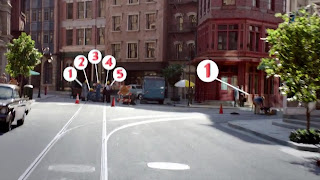Jeremy Bearimy

Michael: While time on Earth moves in a straight line — one thing happens, then the next, then the next — time in the afterlife moves in a Jeremy Bearimy. Eleanor: What? Michael: In the afterlife, time doubles back and loops around and ends up looking something like Jeremy Bearimy. This is the timeline in the afterlife. Happens to kind of look like the name Jeremy Bearimy in cursive English, so that’s what we call it. Eleanor: Sorry. My brain is melting. How can events happen before the ones that happened before? Michael: It’s just the way it works. It’s Jeremy Bearimy. I don’t know what to tell you. That’s the easiest way to describe it. Chidi: OK, but what the hell is this? The dot over the i — what the hell is that? Michael: OK, um, how do I explain this concisely? This is Tuesdays. And also July. Janet: And sometimes it’s never. Michael: That’s true. Occasionally that moment on the Bearimy timeline is the time moment when nothing never occurs. So you get it. Chi


